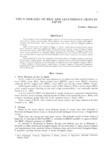Virus Diseases of Rice and Leguminous Crops in Japan
Tropical agriculture research series : proceedings of a symposium on tropical agriculture researches
| ISSN | 03889386 |
|---|---|
| NII recode ID (NCID) | AA00870529 |

Full text
tars19-_51-58.pdf1.52 MB
Virus diseases of rice and leguminous crops are one of the major problems hampering the cultivation of these crops in Japan. These diseases are of great interest to plant pathologists, breeders and biochemists, due to the importance of the crops, and the biological problems involved.
Eight viruses attack rice plants in Japan, i.e. dwarf, stripe, black-streaked dwarf, grassy stunt, transitory yellowing, ragged stunt, Waika and necrosis mosaic viruses. Except for fungalborne necrosis mosaic, most rice viruses are transmitted by leafhoppers. Ecological research on vector insect populations is, therefore, highly significant for virus control. Distribution of the rice virus diseases in Japan and the recent progress in the basic studies on the viruses will be discussed.
Seven leguminous crops are commonly cultivated in Japan, including soybean, azuki bean, French bean, cowpea, peanut, pea and broad bean. Soybean is most widely cultivated throughout Japan. A total of 27 different viruses that infect the leguminous crops in Japan is listed, of which, 11 affect soybean, 8 French bean, 4 azuki bean, 5 cowpea, 3 peanut, 10 pea and 9 broadbean, including 10 viruses specifically detected in Japan. Occurrence and distribution of these viruses will be discussed.
Eight viruses attack rice plants in Japan, i.e. dwarf, stripe, black-streaked dwarf, grassy stunt, transitory yellowing, ragged stunt, Waika and necrosis mosaic viruses. Except for fungalborne necrosis mosaic, most rice viruses are transmitted by leafhoppers. Ecological research on vector insect populations is, therefore, highly significant for virus control. Distribution of the rice virus diseases in Japan and the recent progress in the basic studies on the viruses will be discussed.
Seven leguminous crops are commonly cultivated in Japan, including soybean, azuki bean, French bean, cowpea, peanut, pea and broad bean. Soybean is most widely cultivated throughout Japan. A total of 27 different viruses that infect the leguminous crops in Japan is listed, of which, 11 affect soybean, 8 French bean, 4 azuki bean, 5 cowpea, 3 peanut, 10 pea and 9 broadbean, including 10 viruses specifically detected in Japan. Occurrence and distribution of these viruses will be discussed.
| Date of issued | |
|---|---|
| Creator | Eishiro Shikata |
| Publisher | Japan International Research Center for Agricultural Sciences |
| Volume | 19 |
| spage | 51 |
| epage | 58 |
| Language | eng |
